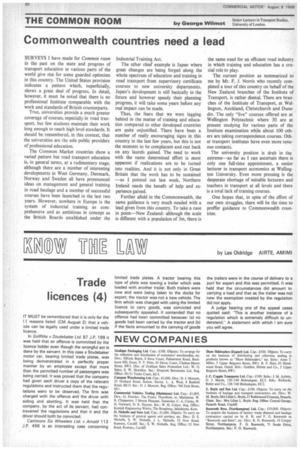Commonwealth countries need a lead
Page 92

If you've noticed an error in this article please click here to report it so we can fix it.
SURVEYS I have made for Common room in the past on the state and progress of transport education in various parts of the world give rise for some guarded optimism in this country. The United States provision indicates a pattern which, superficially, shows a great deal of progress. In detail, however, it must be noted that there is no professional Institute comparable with the work and standards of British counterparts.
True, universities provide a much greater coverage of courses, especially in road transport, but few students maintain their work long enough to reach high level standards. It should be remembered, in this context, that the universities are the sole public providers of professional education.
The Common Market countries show a varied pattern but road transport education is, in general terms, at a rudimentary stage, although there are a number of interesting developments in West Germany. Denmark, Norway and Sweden all have pronounced ideas on management and general training in road haulage and a number of successful courses have been launched in the last two years. However, nowhere in Europe is the system of industrial training as comprehensive and as ambitious in concept as the British Boards established under the Industrial Training Act.
The other chief example is Japan where great changes are being forged along the whole spectrum of education and training in road transport from supervisory certificate courses to new university departments. Japan's development is still basically in the future and however speedy their planning progress, it will take some years before any real impact can be made.
Thus, the fears that we were lagging behind in the matter of training and education compared to other developed countries are quite unjustified. There have been a number of really encouraging signs in this country in the last few years, but this is not the moment to be complacent and rest back on any laurels gained. The need to work with the same determined effort is most apparent if realizations are to be turned into realities. And it is not only in Great Britain that the work has to be sustained —as I pointed out last week, Northern Ireladd needs the benefit of help and experience gained.
Further afield in the Commonwealth, the same guidance is very much needed with a lead given from this country. To take a case in point—New Zealand: although the scale is different with a population of 3m, there is the same need for an efficient road industry in which training and education has a crucial role to play.
The current position as summarized to me by Mr. F. J. Norris who recently completed a tour of this country on behalf of the New Zealand branches of the Institute of Transport, is rather dismal. There are branches of the Institute of Transport, at Wellington, Auckland, Christchurch and Dunedin. The only "live" courses offered are at Wellington Polytechnic where 30 are at present studying for various parts of the Institute examination while about 100 others are taking correspondence courses. Other transport institutes have even more tenuous contacts.
The university position is drab in the extreme—as far as I can ascertain there is only one full-time appointment, a senior lecturer in transport economics at Wellington University. Even more pressing is the desperate shortage of suitable lecturers and teachers in transport at all levels and there is a total lack of training courses.
One hopes that, in spite of the effort of our own struggles, there will be the time to proffer guidance to Commonwealth countries.
















































































































































